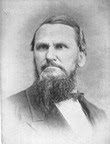Today in Church History: Robert Lewis Dabney

On January 3, 1898, Robert Lewis Dabney died in Victoria, Texas.
Born in Louisa County, Virginia, in 1820, Dabney studied at Hampden-Sidney College, the University of Virginia, and Union Seminary in Virginia. He pastored Tinkling Spring Presbyterian Church for six years before serving on the faculty of Union Seminary from 1859 to 1883 (interrupted by service as a chaplain in the Confederate army during the Civil War). For health reasons he later moved to Texas, where he served eleven years on the faculty of Austin Presbyterian Theological Seminary. After his death, Dabney's body was shipped to Virginia where he was buried in a Confederate uniform.
A lover of the South, Dabney became the leading Southern Presbyterian theologian after the Civil War and a prominent defender of the southern tradition. His writings included a biography of Stonewall Jackson (1866), A Defense of Virginia and Through Her of the South (1867), and his four-volume Discussions (1890-1897). According to historian A. H. Freundt, "Dabney's style was terse, powerful and fresh. Interested in practical matters, he was concerned to apply Christian faith not only to religious topics but also to moral and social philosophy. Because of his willingness to wrestle with difficult theological issues and make his own critical observations, some have regarded Dabney's systematic theology as more profound than that of Charles Hodge."
Labels: History




2 Comments:
One has to respect the precision and theological clarity that Dabney demonstrates, even in handling liberal abolitionist arguments. But this does not change the fact that Dabney was a racist and that he was in denial about the pervasive wickedness of chattel slavery in the South, the cruelty of the "peculiar institution" that was inherent to its operation and security. It is a dangerous thing when status quo theologians can sterilize their arguments at a plane of theological reflection that ignores their own prejudices, the reality of the status quo they are defending, and real human suffering. Dabney's "Defence of Virginia" is a showcase for a brilliant mind and a man who clearly believed the Scriptures and had thrown up ample defenses against liberal theology. Yet he seems cruel, insensitive, and completely a creature of slavery. Although some people would defend him today, or even defend (as did Dabney) the master-slave relation in theory--it would be hard for us to respect anyone who held someone against their will and lived off the fruit of their labor, and used the threat of force in order to sustain it. One doesnt have to be a liberal "abolitionist" to see this. Nor was every anti-slavery person in his era a "Socinian" or New England liberal, which is a stereotype that neo-Confederate Calvinists like to use when speaking of the Abolitionists. Abolitionism was not a monolith. Consider the Calvinist "Covenanter" Reformed people who were die-hard anti-slavery people; they were no less devoted to covenant theology and the Puritan legacy than the Southern presbys, but they were strongly against slavery. Dabney was blinded by his own racial prejudice and sectional loyalty. In history and eternity, he will be weighed in the balances and found lacking. Shame on him.
Louis, I appreciated your balanced and thoughtful comments. I tend to agree with you about Dabney: I have admiration for his intellect and for much of his theological writings, but find his racism, defense of chattel slavery, and call for “good haters” repugnant. But I am also reminded to take men in their time. It’s easy for us, today, to fall prey to our culture; so too was it in times past, which is something we should consider when judging men of antiquity.
Thanks again for your comments.
--Shawn
Post a Comment
<< Home